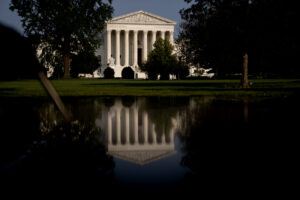
(Photographer: Stefani Reynolds/Bloomberg)
The Supreme Court rejected Donald Trump’s insane theory that presidents can only be criminally prosecuted if the House impeached and the Senate convicted on the exact behavior in the indictment.
The Chief Justice, writing for the majority, eschewed the thoughtful and detailed opinion of the D.C. Circuit and decided “well, maybe presidents really can assassinate their political rivals!”
As many have noted… Joe Biden now has the opportunity to do the funniest thing.
It is these enduring principles that guide our decision in this case. The President enjoys no immunity for his unofficial acts, and not everything the President does is official. The President is not above the law. But Congress may not criminalize the President’s conduct in carrying out the responsibilities of the Executive Branch under the Constitution. And the system of separated powers designed by the Framers has always demanded an energetic, independent
Executive. The President therefore may not be prosecuted for exercising his core constitutional powers, and he is entitled, at a minimum, to a presumptive immunity from prosecution for all his official acts. That immunity applies equally to all occupants of the Oval Office, regardless of politics, policy, or party.
This rule will not, in fact, apply “equally to all occupants of the Oval Office, regardless of politics, policy, or party.”

How Legisway Helps In-House Teams Manage All Legal Matters In One Trusted Place
Operate with AI driven insights, legal intake, unified content and modular scalability to transform efficiency and clarity.
The majority engages in a sanctimonious bait-and-switch, leaning upon an official vs. unofficial distinction without difference. Should presidents be immune from criminal statutes that undermine constitutional duties of the office? Sure. Does the commander-in-chief power extend to a president carrying out domestic assassinations? The majority is just going to gloss over that bit.
As for the dissents, they strike a tone of chilling doom that is wholly disproportionate to what the Court actually does today—conclude that immunity extends to official discussions between the President and his Attorney General, and then remand to the lower courts to determine “in the first instance” whether and to what extent Trump’s remaining alleged conduct is entitled to immunity.
Actually the decision to grant absolute immunity to “official discussions between the President and his Attorney General” goes pretty far. It functionally swallows any line between official and unofficial acts because — like here — where the president allegedly used his official reports to take unofficial acts, this Court says it’s covered. Unsatisfied with this sweeping grant of immunity, the Court heaps another failsafe on the job by ruling that to the extent an unofficial act is carried out through bogus official means, that evidence is inadmissible.
In other words, maybe assassinating a rival isn’t legal, but prosecutors can’t use any documents or testimony relating to the order so good luck proving anything at trial.
Even ACB couldn’t join that bit, opting to join the dissent for the limited purpose of at the very least barring presidents from papering over criminality with fancy letterhead:
I understand most of the Court’s opinion to be consistent with these views. I do not join Part III–C, however, which holds that the Constitution limits the introduction of protected conduct as evidence in a criminal prosecution of a President, beyond the limits afforded by executive privilege. See ante, at 30–32. I disagree with that holding; on this score, I agree with the dissent. See post, at 25–27 (SOTOMAYOR, J., dissenting). The Constitution does not require blinding juries to the circumstances surrounding conduct for which Presidents can be held liable. Consider a bribery prosecution—a charge not at issue here but one that provides a useful example. The federal bribery statute forbids any public official to seek or accept a thing of value “for or because of any official act.” 18 U. S. C. §201(c). The Constitution, of course, does not authorize a President to seek or accept bribes, so the Government may prosecute him if he does so. See Art. II, §4 (listing “Bribery” as an impeachable offense); see also Memorandum from L. Silberman, Deputy Atty. Gen., to R. Burress, Office of the President, Re: Conflict of Interest Problems Arising Out of the President’s Nomination of Nelson A. Rockefeller To Be Vice President Under the Twenty-Fifth Amendment to the Constitution 5 (Aug. 28, 1974) (suggesting that the federal bribery statute applies to the President). Yet excluding from trial any mention of the official act connected to the bribe would hamstring the prosecution. To make sense of charges alleging a quid pro quo, the jury must be allowed to hear about both the quid and the quo, even if the quo, standing alone, could not be a basis for the President’s criminal liability.
Oh… I don’t know if bribery is illegal anymore. But points for the effort.
Meanwhile, Justice Sotomayor asks whether or not textualism matters anymore and then answers it conclusively:
The majority calls for a “careful assessment of the scope of Presidential power under the Constitution.” Ante, at 5. For the majority, that “careful assessment” does not involve the Constitution’s text. I would start there.
To some extent, this is the problem the liberals face while the majority plays Calvinball with the Constitution. While academically satisfying, pointing out that the majority routinely abandons the analytical tools they pretend to care about only matters if the conservatives feel shame. They do not.
Meanwhile, the dissents just further lend legitimacy to this bankrupt facade of an interpretive philosophy, crafting opinions that get chopped up later for conservatives to say, “see, even my colleagues recognize that textualism is everything.” It’s an understandable approach to dissenting… but in the end, it’s not advancing the ball much.
First, the Framers clearly knew how to provide for immunity from prosecution. They did provide a narrow immunity for legislators in the Speech or Debate Clause. See Art. I, §6, cl. 1 (“Senators and Representatives . . . shall in all Cases, except Treason, Felony and Breach of the Peace, be privileged from Arrest during their Attendance at the Session of their respective Houses, and in going to and returning from the same; and for any Speech or Debate in either House, they shall not be questioned in any other Place”). They did not extend the same or similar immunity to Presidents.
Second, “some state constitutions at the time of the Framing specifically provided ‘express criminal immunities’ to sitting governors.” Brief for Scholars of Constitutional Law as Amici Curiae 4 (quoting S. Prakash, Prosecuting and Punishing Our Presidents, 100 Tex. L. Rev. 55, 69 (2021)). The Framers chose not to include similar language in the Constitution to immunize the President. If the Framers “had wanted to create some constitutional privilege to shield the President . . . from criminal indictment,” they could have done so. Memorandum from R. Rotunda to K. Starr re: Indictability of the President 18 (May 13, 1998). They did not.
Third, insofar as the Constitution does speak to this question, it actually contemplates some form of criminal liability for former Presidents. The majority correctly rejects Trump’s argument that a former President cannot be prosecuted unless he has been impeached by the House and convicted by the Senate for the same conduct. See ante, at 32–34; Part IV–C, infra. The majority ignores, however, that the Impeachment Judgment Clause cuts against its own position. That Clause presumes the availability of criminal process as a backstop by establishing that an official impeached and convicted by the Senate “shall nevertheless be liable and subject to Indictment, Trial, Judgment and Punishment, according to Law.” Art. I, §3, cl. 7 (emphasis added). That Clause clearly contemplates that a former President may be subject to criminal prosecution for the same conduct that resulted (or could have resulted) in an impeachment judgment—including conduct such as “Bribery,” Art. II, §4, which implicates official acts almost by definition.
There’s no text for this. The Framers knew there could’ve been text for it and did not include it. And there’s contemporaneous historical evidence backing up this reading. In response, the Chief writes:
The Court’s prior admonition is evident in the principal dissent’s citations. Some of its cherry-picked sources do not even discuss the President in particular.
Cherry-picked? Cherry-picked? The unmitigated fucking gall to accuse the dissent of historical cherry-picking for citing the Constitution, the context of historical state constitutions, a brief compiled by legal historians, Alexander Hamilton — the guy from the musical! — and James Madison after striking down abortion rights based on a goddamned witch hunter and blowing off a detailed historical record to rewrite the Second Amendment on pure vibes is so rich Clarence Thomas is already hitting it up for free vacations.
Stop pretending these are serious people. These are not serious people.
(Opinion on the next page…)
